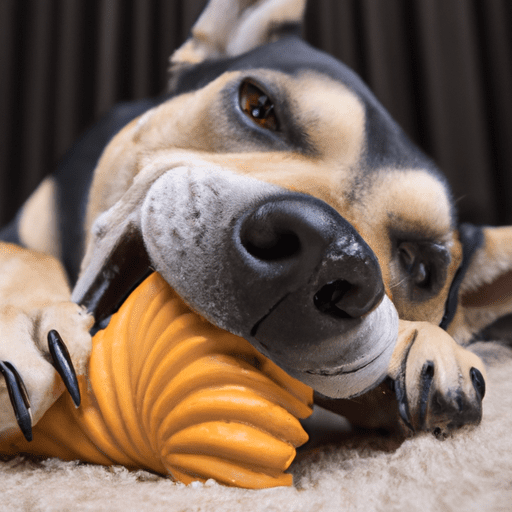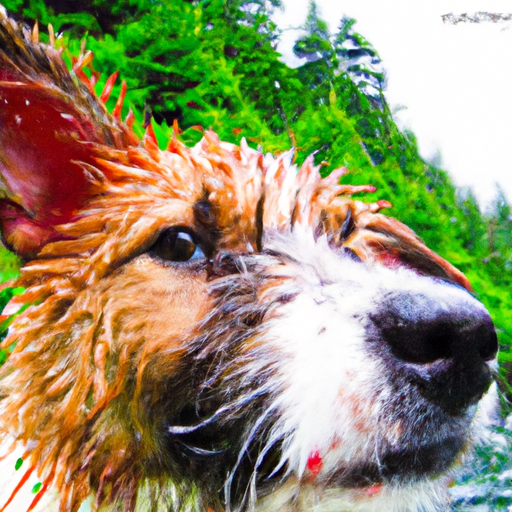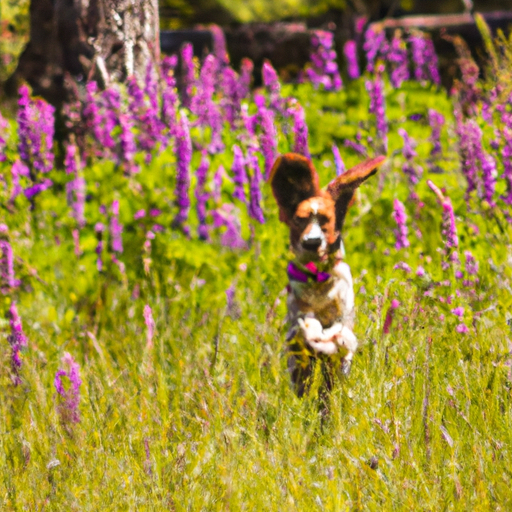If you find yourself constantly wondering how to quiet down your furry friend's barks, then you've come to the right place. In this article, we will guide you through some practical tips and techniques to help you put an end to your puppy's excessive barking. From understanding the reasons behind their vocal nature to implementing effective training methods, you will soon discover that a peaceful and harmonious household is within reach. So, grab a treat for your pup and let's embark on this journey together!
Establishing a Routine
Create a Consistent Schedule
One of the first steps in stopping your puppy from barking excessively is to establish a consistent schedule. Dogs, especially puppies, thrive on routine and knowing what to expect. By creating a structured daily routine for your puppy, you can help alleviate some of their excess energy and reduce their chances of barking out of boredom or frustration.
Set specific times for meals, walks, playtime, and training sessions. Stick to these times as closely as possible, as this will help your puppy understand what is expected of them and when they will have opportunities for exercise and mental stimulation. A consistent schedule can help prevent your puppy from becoming anxious or restless, which can contribute to excessive barking.
Introduce Regular Exercise
Regular exercise is key to keeping your puppy happy and content, which in turn can help reduce their barking. Just like humans, dogs need physical activity to burn off energy and keep their minds stimulated. A tired puppy is less likely to bark excessively, as they will be too worn out to engage in disruptive behavior.
Make sure to provide your puppy with plenty of opportunities for exercise throughout the day. Take them for walks, play fetch in the backyard, or engage in other physical activities that they enjoy. Regular exercise will not only tire them out but also contribute to their overall well-being.
Ensure Ample Rest Time
In addition to exercise, it's important to provide your puppy with ample rest and relaxation time. Puppies, like babies, need plenty of sleep to grow and develop properly. Lack of sleep can make them cranky and more prone to excessive barking.
Create a quiet and comfortable space for your puppy to rest. Provide them with a cozy bed or crate where they can retreat when they need some downtime. Establishing a designated rest area not only helps your puppy get the rest they need but also signals to them that it's okay to relax and be calm. A well-rested puppy is generally more relaxed and less likely to engage in excessive barking.
Understanding the Cause of Excessive Barking
Separation Anxiety
One common cause of excessive barking in puppies is separation anxiety. Puppies are naturally social animals and can become distressed when separated from their owners. This anxiety often manifests as barking, whining, or destructive behavior.
To address separation anxiety, gradually get your puppy used to being alone for short periods of time. Start by leaving them alone in a separate room for a few minutes and gradually increase the duration as they become more comfortable. It's important to avoid making a big fuss when leaving or returning, as this can reinforce their anxious behavior. Instead, keep your departures and arrivals calm and low-key.
Fear and Insecurity
Puppies may also bark excessively out of fear or insecurity. Common triggers include loud noises, unfamiliar people, or other animals. It's important to identify the specific triggers that cause your puppy's fearful behavior and work on desensitizing them to these stimuli.
Introduce your puppy to new experiences and environments gradually, using positive reinforcement techniques. Gradually expose them to triggering stimuli while providing treats or praise when they remain calm. Over time, your puppy will learn to associate these previously fear-inducing situations with positive outcomes, reducing their urge to bark.
Attention-seeking Behavior
Some puppies may bark excessively to get attention from their owners. This can be especially common if the puppy has learned that barking results in their owners giving them attention, whether it's positive or negative.
To address attention-seeking behavior, it's important to teach your puppy that barking will not result in attention. When your puppy barks for attention, simply ignore them until they are quiet. Once they have calmed down, reward them with praise or a treat. Consistently reinforcing quiet behavior and ignoring unwanted barking will help your puppy understand that barking doesn't lead to attention, discouraging them from using it as a strategy.
Positive Reinforcement Training
Teach the ‘Quiet' Command
One of the most effective techniques to stop your puppy from barking excessively is to teach them the ‘quiet' command. This command will signal to your puppy that they should stop barking and remain calm.
Start by selecting a specific word or phrase, such as “quiet” or “enough,” to use as the command. When your puppy starts barking, calmly say the command and wait for them to stop barking. As soon as they are quiet, reward them with praise and a treat. With consistent practice and reinforcement, your puppy will learn to associate the command with ceasing their barking behavior.
Reward Desirable Behavior
Positive reinforcement is a powerful tool when it comes to training your puppy to stop excessive barking. Rewarding your puppy for desirable behaviors, such as being quiet or remaining calm, will help reinforce these behaviors and encourage them to continue behaving in a desirable manner.
Whenever your puppy exhibits calm or quiet behavior, immediately praise and reward them. Use treats, verbal praise, or even a favorite toy as a reward. By consistently rewarding your puppy for desirable behavior, you will reinforce that being quiet is rewarded and increase the likelihood of them behaving appropriately in the future.
Ignore Unwanted Barking
While positive reinforcement is crucial, it's equally important to avoid inadvertently reinforcing unwanted barking. Giving attention or scolding your puppy when they bark may actually reinforce their behavior, as they are still receiving a reaction from you.
When your puppy starts barking unnecessarily, resist the urge to react or engage with them. Avoid eye contact, turn away from them, and withhold attention until they are quiet. Once they have stopped barking, you can then provide praise and rewards for their quiet behavior. Consistency is key in teaching your puppy that barking will not get them the attention they seek.
Desensitization and Counterconditioning
Expose Your Puppy Slowly to Triggering Stimuli
If your puppy barks excessively at specific triggers, such as strangers or loud noises, it's important to gradually expose them to these stimuli in a controlled and positive manner. This process is known as desensitization.
Start by introducing your puppy to these triggers from a distance that does not elicit a strong barking response. For example, if your puppy barks at strangers, have a trusted friend approach from a distance and reward your puppy for remaining calm. Gradually decrease the distance between your puppy and the trigger, always rewarding calm behavior. This gradual exposure will help them build positive associations with the triggering stimuli.
Create Positive Associations
Counterconditioning involves creating positive associations with triggering stimuli. For example, if your puppy barks at loud noises, you can pair the noise with something pleasant, such as treats or playtime. This helps change your puppy's emotional response to the trigger, reducing their barking.
When exposing your puppy to triggering stimuli, have treats or toys readily available. Each time the trigger occurs, engage your puppy's attention with the treats or toys, diverting their focus away from barking. Over time, they will start associating the previously feared stimuli with positive experiences, reducing their need to bark.
Gradually Increase Exposure
Once your puppy is able to remain calm in the presence of triggering stimuli at a close distance, gradually increase their exposure level. This could involve taking your puppy on walks in busier areas or having strangers or other dogs interact with them under controlled circumstances.
Always remember to reward your puppy for calm behavior during these exposure sessions. Gradually increasing the intensity and duration of these exposures will help build your puppy's confidence and reduce their tendency to bark excessively.
Providing Mental Stimulation and Distractions
Engage in Interactive Play
Puppies, especially those with excess energy, need mental stimulation to keep them engaged and prevent boredom-related barking. Interactive play sessions, such as tug-of-war or fetch, can provide both mental and physical exercise for your puppy.
Choose toys or games that encourage problem-solving and engage your puppy's mind. Rotate toys regularly to keep them interesting and prevent your puppy from losing interest. By providing mental stimulation through play, you can help redirect your puppy's energy and reduce their desire to bark excessively.
Use Puzzle Toys and Treat Dispensers
Another way to provide mental stimulation and distract your puppy from excessive barking is through the use of puzzle toys and treat dispensers. These toys require your puppy to figure out how to access treats or food, providing mental exercise and entertainment.
Fill these toys with treats or kibble and let your puppy work at getting the rewards out. This not only keeps them occupied and mentally engaged but also rewards them for quiet and persistent behavior. By redirecting their focus to these toys, you can provide a positive outlet for their energy and reduce their barking tendencies.
Introduce New Experiences and Environments
Diversifying your puppy's experiences can help prevent boredom and reduce excessive barking. Introduce them to new environments, such as parks or dog-friendly stores, where they can encounter different sights, sounds, and smells. This exposure to new experiences can help stimulate their minds and prevent them from becoming bored and resorting to excessive barking.
When introducing your puppy to new experiences, make sure to offer plenty of positive reinforcement. Reward your puppy for calm behavior and keep the experience fun and engaging. Through exposure to new environments, you can further socialize your puppy and teach them to adapt to different situations, ultimately reducing their barking.
Avoiding Reinforcement of Barking
Do Not Give in to Demands
Some puppies learn that barking will result in getting what they want, whether it's attention, food, or playtime. To prevent this, it's important to avoid giving in to their demands when they bark.
For example, if your puppy barks for food, wait for them to be quiet before providing their meal. If they bark for attention, only engage with them once they have stopped barking. Consistently reinforcing that barking does not result in getting what they want will help discourage this behavior over time.
Avoid Punishment or Yelling
While it may be tempting to scold or yell at your puppy when they bark excessively, this can often make the problem worse. Punishment or aggression can increase your puppy's anxiety and fear, leading to even more barking.
Instead of resorting to punishment, focus on positive reinforcement techniques to encourage desirable behavior. By rewarding calm and quiet behavior, your puppy will learn that being quiet is the preferred option.
Prevent Reinforcement from Others
It's important to communicate with family members, friends, or neighbors about your efforts to stop excessive barking. Let them know that they should avoid inadvertently reinforcing the behavior by giving in to your puppy's demands when they bark.
Consistency is key in training, and it's essential that everyone in your puppy's environment is on the same page. By preventing reinforcement from others, you can ensure that your puppy receives consistent messages about appropriate behavior and barking.
Managing the Environment
Remove Triggers and Distractions
In some cases, excessive barking may be triggered by specific objects or situations in your puppy's environment. Take note of any potential triggers, such as doorbells, passing cars, or certain noises, and do your best to remove or minimize them.
For example, you can use curtains or blinds to block your puppy's view of the street if passing cars trigger their barking. Consider soundproofing the windows or using white noise machines to minimize noise-related barking. By removing or reducing these triggers, you can help create a calmer environment for your puppy.
Create a Calm and Comfortable Environment
A calm and comfortable environment can contribute to reducing excessive barking. Make sure your puppy has a comfortable bed or crate to retreat to when they need some downtime. Provide them with a cozy and quiet space where they feel safe and secure.
Consider using calming agents, such as pheromone sprays or lavender-infused products, to create a calming atmosphere. Additionally, maintaining a consistent temperature, ensuring proper ventilation, and avoiding excessive clutter can all contribute to a peaceful environment for your puppy.
Consider White Noise or Music
Background noise, such as white noise or calming music, can help mask external sounds that may trigger your puppy's barking. These ambient sounds can create a soothing atmosphere and help drown out noises that may cause your puppy to bark excessively.
Experiment with different types of white noise or music to find what works best for your puppy. Many streaming platforms offer dedicated playlists or channels designed specifically for calming pets. By providing a consistent background noise, you can help create a more relaxed environment and reduce barking.
Seeking Professional Help
Consult with a Veterinarian or Animal Behaviorist
If your puppy's excessive barking persists despite your best efforts, it may be beneficial to consult with a veterinarian or animal behaviorist. They can help identify any underlying medical or behavioral issues that may be contributing to the problem.
A veterinarian can rule out any potential health problems that may be causing discomfort or pain, which could manifest as excessive barking. An animal behaviorist can assess your puppy's behavior and provide additional guidance and training techniques tailored to your specific situation.
Explore Puppy Training Classes
Puppy training classes can be a great resource for addressing and preventing excessive barking. These classes provide structured training sessions and guidance from experienced trainers, enabling you to learn effective training techniques and better understand your puppy's behavior.
In addition to obedience training, these classes often address common behavioral issues, including excessive barking. Working with a professional trainer and attending regular classes can help establish a strong foundation for your puppy's training, including appropriate barking behavior.
Consider Behavior Modification Therapy
For severe cases of excessive barking, behavior modification therapy may be necessary. This therapeutic approach uses various techniques, such as desensitization and counterconditioning, to address your puppy's specific barking triggers.
A certified animal behaviorist or qualified dog trainer will work closely with you and your puppy to develop an individualized behavior modification plan. This may involve implementing specific training exercises and gradually exposing your puppy to triggering stimuli. With time and consistency, behavior modification therapy can help reduce your puppy's excessive barking and improve their overall behavior.
Utilizing Anti-Barking Aids
Use Citronella or Ultrasonic Collars
Citronella or ultrasonic collars are commonly used as a deterrent for excessive barking. These collars emit a harmless spray of citronella or a high-pitched ultrasonic sound when activated by your puppy's barking.
When considering anti-barking collars, it's important to thoroughly research and choose a reputable brand that ensures the safety and well-being of your puppy. It's recommended to consult with a veterinarian or professional trainer before implementing the use of any anti-barking aids.
Try Anti-Barking Devices
There are various types of anti-barking devices available on the market that can help discourage excessive barking. These devices work by emitting a loud noise or vibration whenever your puppy barks.
Some examples include stationary devices that activate when they detect barking in a specific area or handheld devices that you can trigger manually. Similar to anti-barking collars, it's important to research and choose reliable devices that prioritize your puppy's safety and well-being.
Consider Behavioral Modification Tools
Certain behavioral modification tools can assist in training your puppy to reduce excessive barking. For example, a noisemaker, such as a whistle or can filled with coins, can be used to interrupt barking and redirect your puppy's attention.
However, it's important to remember that these tools should be used as part of a comprehensive training plan and not relied upon as the sole method of stopping excessive barking. Consultation with a professional trainer or behaviorist is recommended to ensure proper and effective use of these tools.
Consistency and Patience
Be Patient and Consistent
Addressing and stopping excessive barking in puppies requires patience and consistency. Training takes time, and it's important to be patient with your puppy as they learn new behaviors and habits.
Consistency is also key in preventing and addressing excessive barking. Stick to your established routine, training techniques, and behavior modification strategies. The more consistent you are in your approach, the faster your puppy will understand what is expected of them and how to behave appropriately.
Realistic Expectations
It's important to have realistic expectations when it comes to training your puppy to stop excessive barking. Some puppies may respond quickly and show improvement within a short period, while others may take longer to modify their barking behavior.
Every puppy is unique, and progress will depend on their individual temperament, past experiences, and training history. Celebrate small victories and be patient with setbacks. With time and consistent effort, you can help your puppy develop appropriate barking habits and minimize excessive barking.
Monitor Progress and Make Adjustments
As you work towards reducing your puppy's excessive barking, it's important to monitor their progress and make adjustments as needed. Pay attention to any patterns or triggers that may be contributing to their barking and adapt your training techniques accordingly.
Remember that training is an ongoing process, and it's natural to encounter challenges along the way. Seek advice from professionals, such as trainers or behaviorists, if needed, and remain committed to consistently working with your puppy to address their barking behavior.
In conclusion, by establishing a routine, understanding the cause of excessive barking, utilizing positive reinforcement training, applying desensitization and counterconditioning techniques, providing mental stimulation and distractions, avoiding reinforcement of barking, managing the environment, seeking professional help when necessary, utilizing anti-barking aids responsibly, and maintaining consistency and patience, you can effectively stop your puppy from barking excessively. Remember to always approach your puppy's training with a friendly and empathetic tone, as building a strong bond based on trust and positive reinforcement is vital in stopping unwanted barking. With proper guidance and dedication, you can help your puppy develop into a well-behaved, quiet companion.






